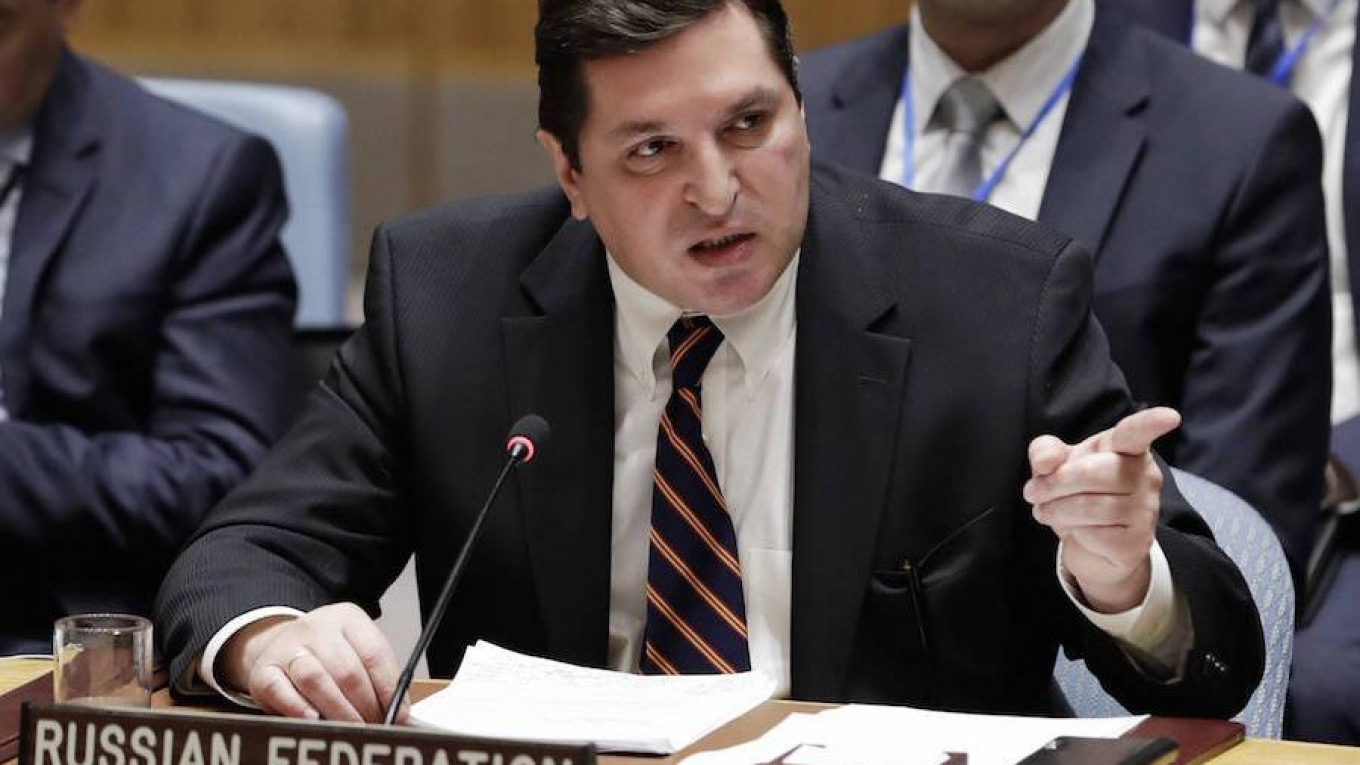Слышь: Yo! I'm talking to you!
Not every diplomat can become an overnight “хит интернета” (Internet hit) after just one speech at the United Nations. That honor goes to Vladimir Safronkov, deputy permanent representative from Russia, who publicly took to task Mathew Rycroft, the U.K. Ambassador to the U.N. last week.
The brouhaha was not because one delegate yelled at another delegate — that happens dozens of times every day. And it wasn’t because of the nature of Safronkov’s accusations —everyone has heard Russia’s version of the Syrian war a million times. No, the скандал (scandal) was over the way Safronkov spoke to his esteemed British colleague. Officially it was called достаточно жестко (sufficiently harsh). Unofficially it was called everything from грубое панибратство (crude over-familiarity) to приблатнённое хамство (obnoxious thug slang). In fact, much of the Internet thought he sounded like a гопник, one of those squatting, sunflower-seed-spitting, good ole boys who do manual labor and a bit of robbery on the side.
You wouldn’t know this from the official transcripts, which cleaned up Safronkov’s language, primarily switching his familiar, street-talking ты to the more decorous and collegial вы. So he didn’t actually say: Посмотрите на меня и не отводите глаза (Look at me and don’t look away). He said: Посмотри на меня! Глаза не отводи! Чё ты глаза отводишь? (Hey, look at me! At me, I said! Where you looking?) And he didn’t end his tirade with the strong but literary: Не смейте, г-н Райкрофт, больше оскорблять Россию! (Don’t you dare, Mr. Rycroft, insult Russia again!) He continued to use ты: Не смей оскорблять Россию больше! (Yo, quit putting Russia down!)
Should you ever need to put someone firmly in his place, let your business partners know how disappointed you are in them, or establish rules of behavior with your neighbors, you may want to master some гопник-talk. To channel your inner Russian Ratso Rizzo, all you have to do is remember a few simple rules.
First, forget the word что (what). Practice saying чё or чо. Cut it short and spit it out: Ты чё? (What’s wid you?) Or stretch it out for five beats: Чё-ё-ё-ё-ё-ё-ё? (What you saying? Say again. Are you nuts or what?) Чё нет? (Whadya mean, no?) should be used whenever you are displeased or surprised by someone’s refusal. Чё да? (Whadya mean, yes?) should be used when you either require more information or when you think you’ve been disrespected.
Then, cut words in half. In fact, make as many words as possible one syllable, two at most. Remember: not слышите but слышь (listen); not сейчас or even щас, but ща (in a sec); not зажигалка but жига (lighter).
The more adventurous can try to master the sound б—я [blya], (an abbreviation of a very nasty word for a woman of ill repute), which can be used to describe anything really good or really bad; to express surprise; and of course to address people, from your significant other to a salesperson. Or it can be added to any word to imbue it with a kind of cheery informality. For example, на, б— я is a friendly гопник way of asking someone to take your payment for goods or services.
And, best of all, eschew cases. Instead of Сколько времени, ask: Сколько время? (You got the time?)
Got it? Great. Next week: how to squat and spit sunflower seeds.
Michele A. Berdy is a Moscow-based translator and interpreter, author of “The Russian Word’s Worth,” a collection of her columns. Follow her on Twitter @MicheleBerdy.
A Message from The Moscow Times:
Dear readers,
We are facing unprecedented challenges. Russia's Prosecutor General's Office has designated The Moscow Times as an "undesirable" organization, criminalizing our work and putting our staff at risk of prosecution. This follows our earlier unjust labeling as a "foreign agent."
These actions are direct attempts to silence independent journalism in Russia. The authorities claim our work "discredits the decisions of the Russian leadership." We see things differently: we strive to provide accurate, unbiased reporting on Russia.
We, the journalists of The Moscow Times, refuse to be silenced. But to continue our work, we need your help.
Your support, no matter how small, makes a world of difference. If you can, please support us monthly starting from just $2. It's quick to set up, and every contribution makes a significant impact.
By supporting The Moscow Times, you're defending open, independent journalism in the face of repression. Thank you for standing with us.
Remind me later.








